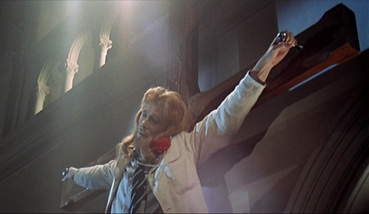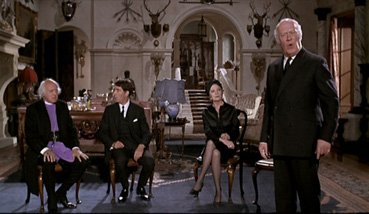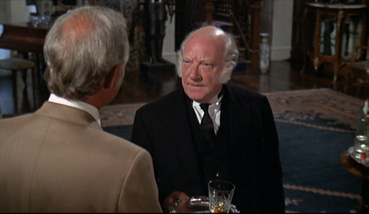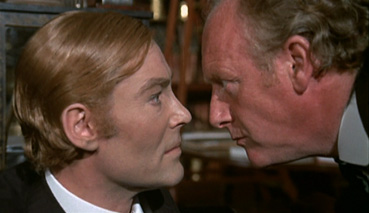| |
"Behaviour which is considered insanity in a tradesman is looked on as mild eccentricity in a Lord." |
| |
Jack Arnold Alexander Tancred Gurney, 14th Earl of Gurney |
It's possible to take even the most mundane and ordinary word and make it funny with the right context and delivery. Take, as an example, the common greeting 'hello', a word most of us use on a daily basis but few would describe as comical. But ten minutes into the 1972 film The Ruling Class, Peter O'Toole walks slowly into a room occupied by expectant relatives and says just that one word, and it's hilarious. That he's attired in the manner of a rather well known religious icon only adds to the fun.
Adapted by Peter Barnes from his own play and directed by Peter Medak, The Ruling Class is an initially playful but ultimately barbed attack on the English landed gentry, the church, and the system of hereditary lords. It's joy comes not so much from its politics (oh well, maybe just a bit) but the wit and invention of its script, its semi-surreal handling, and a glorious cast at the top of its comedic game. And let's remind ourselves that we're talking performers previously known for their dramatic rather than comic performances, with one notable exception, and even he's likely to surprise you.
O'Toole plays Jack Arnold Alexander Tancred Gurney, who is suddenly promoted to the position of 14th Earl of Gurney when his father Ralph (Harry Andrews) accidentally hangs himself while indulging in a spot of auto-erotic asphyxiation while clothed in a military dress coat and a ballerina's tutu. The Gurney family are of the opinion that Jack is unfit to hold the title because he think's he's Jesus. Ralph's brother Sir Charles (William Mervyn) decides that the best way forward would be to marry him off to ambitious good-time girl Grace Shelley (Carolyn Seymour), and on the production of an heir have him certified insane, leaving the family to run the estate. To this end, Sir Charles' wife Lady Claire (Coral Browne) enlists the services of German psychiatrist Doctor Herder (Michael Bryant), who's angling for a grant to fund his research on paranoid schizophrenic rats and is happy to succumb to milady's advances to secure it.

Jack takes his role as the God of Love seriously, dressing in robes, wearing his hair long and sleeping upright on a crucifix. His conviction of his identity is driven by a peculiar logic – when asked how he knows he is God he replies "Simple – when I pray to Him, I find I am talking to myself." His erratic behaviour may bemuse and even outrage his relatives, but they're no better, just a lot less fun. Sir Charles is a bigoted womaniser, Lady Claire a scheming man-eater, and their son Dinsdale a daffy twit. Floating mischievously on the periphery is cynical butler Tucker (Arthur Lowe), who having come into money in the late Earl's will, has remained in service to honour a promise and keep an eye on Jack, and delights in expressing his contempt for the people he nominally serves.
Right from the start, we're firmly on Jack's team. Delusional he may be, but he's also an exuberant 60s free spirit, a symbol of anarchic rebellion in an established order of controlling and backward-thinking traditionalists. Jack's every encounter with others is a source of frustration for them and innocent amusement for him. He never misses an opportunity to remind them of his supposed divinity, responding to Charles' outraged "Oh my God!" with a cheerful "Yes?" and proceeding a meal with the blessing "For what I am about to receive, may I make myself truly thankful." His upbeat charm also puts an immediate spanner in Charles' big plan when Shelley genuinely falls for him and is soon taking his side against the family and Sir Charles in particular. The two eventually marry (in a side-splitting ceremony conducted by doddering family relative Bishop Lampton, played by a gloriously shocked and befuddled Alistair Sim) and Shelley quickly becomes pregnant, but by then Lady Claire is determined to undermine her husband and charges Herder with the job of restoring the new Earl to sanity. "If ever he answers to the name of Jack," Heder assures her (Jack shuns the name and prefers to be called J.C.), "then you know he's on the road to sanity." Boy is he in for a surprise.
The film's stage play origins are clearly evident in the set-piece structure, the limited locations, and the arrangement and movement of characters within the frame, but also in the ambition and complexity of dialogue and story development. It feels only appropriate that the performers run with their roles a little, picking up on a madness endemic to this protected and privileged societal enclave, who live by rules of their own invention. O'Toole in particular clearly delights in a role that calls for a wide diversity of emotions and delivery, from the sing-song optimism of the early scenes, through the wide-eyed trauma of his 'cure' at the hands of the electricity-shooting 'high-voltage Messiah' McKyle (Nigel Green), to the subsequent explosions of isolated mania and the icily fragile façade of his reborn incarnation, all of which the actor handles with an authority and diction that borders on the Shakespearian.

Fine support is provided all round, from William Mervyn's disapproving bluster as Sir Charles and Coral Browne's weary but still hot-to-trot Lady Claire to Carolyn Seymour's self-confident swagger as Grace, and James Villiers' tag-along daftness as Dinsdale. Harry Andrews plays Ralph Gurney with the sort of barking authority that made his role Lord Lucan in Tony Richardson's The Charge of the Light Brigade so memorable four years earlier, a connection emphasised by the costume he kits himself out in for his session with the hangman's noose (watch Light Brigade again afterwards and you'll be convinced that Lucan has a tutu in his tent for after-hours amusement). The icing on the supporting cast cake is Alistair Sim, whose weary and wide-eyed disbelief at just about everything anyone says is an unbridled joy.
But even Sim is outdone in his bullseye comedic timing by Arthur Lowe, an actor best known to audiences today for his defining role as Captain Mainwaring in Dad's Army but who enjoyed a long and successful stage and screen career in a variety of dramatic and comedic roles, including key appearances in Lindsay Anderson's If...., O, Lucky Man! and Britannia Hospital. He relishes his role as Tucker, a closet revolutionary whose restraints are removed to allow him free expression in a community not used to tolerating back-chat from a member of the lower order. Whether it be announcing Jack's arrival by smashing an expensive vase, or dancing with joy over the body of a murdered aristocrat ("One less!" he cries with delight, "Praise the Lord!"), his every appearance prompts a gleeful smile of expectation and he never disappoints – despite having considerably less screen time, it's a genuinely tough call as to whether he or O'Toole score the most laughs. One of Tucker's most telling moments, however, comes as he prepares Jack for his encounter with psychiatric evaluator Truscott (Graham Crowden – the Lindsay Anderson connections just keep building), whose quietly spoken advice to "watch yourself in there, sir," betrays a protective concern that recognises in Jack something that sets him apart from others of his breed. It's this moment in particular that makes a later act of betrayal kick as hard as it does. (As a side note, it's rather heartening that, despite his Dad's Army success, when you look Arthur Lowe up on the IMDb the identifying description it offers is 'Actor, The Ruling Class'.)
That the film edges into the surreal is inevitable given that we're dealing with a man considered to be bonkers even within a community of reality disassociates, an aspect that Barnes and Medak emphasise with sudden and unexpected bursts into song, ranging from Onward Christian Soldiers to The Varsity Rag and even Dem Bones. Jack's vigorous duet of the Eaton Boating Song with fellow alumni Truscott, meanwhile, works as both a priceless comedy moment and an undisguised but still relevant comment on the corruptive power of the old boy network. The actors do their own singing, but in other ways the technique directly prefigures Dennis Potter's use of song in his groundbreaking TV series Pennies From Heaven six years later.

If the satirical digs feel a bit light in the early scenes, then this all changes in the film's final third, when the comedy recedes to make way for a full-out assault on that portion of British society that was once categorised by the title of the film. It may feel just a tad heavy-handed in places, but is true to the revolutionary thinking of the time and is handled with such panache – Jack's vision of a cobwebbed and skeletal House of Lords is still visually striking – that only those at the bullet end of the assault are likely to complain.
The Ruling Class remains a showcase for 1970s British writing, filmmaking and performance at it's most creative. Theatrical yes, but in the best sense of the term, its purpose and passion infused with a rare degree of wit and invention in all departments. Even the more direct dialogue barbs are given comic sparkle by their delivery: speaking of Jack's upbringing, Dr. Herder observes that "they sent him away, alone, into a primitive community of licensed bullies and pederasts," to which an unfazed Sir Charles responds, "You mean he went to public school." But it's Tucker (of course) who most bluntly sums up the film's satirical target. When asked by Dr. Heder if he's noticed anything odd about his new master, he delivers this glorious response: "Odd? Oh, you mean nutty. Yes, he's a nutcase. Most of these titled fleabags are. Rich nobs and privileged arseholes can afford to be bonkers. They're living in a dream world, aren't they sir. Life's made too easy for them. They don't have to earn a living so they do just what they want to. We'd all look pretty crackers if we went around doing just what we wanted to, wouldn't we." Just marvellous.
At first glance, Optimum appears to have scored here by sourcing the transfer from Criterion, who restored the film for a US DVD release in 2001. Unfortunately, the NTSC to PAL transfer has resulted in a softer picture than you'll find on the Criterion original, and very visible motion issues on camera and character movements, of which there are a great many. This effectively scuppers Criterion's fine work and is distracting enough – particularly on a large plasma TV (and the issues are still very visible on a smaller CRT screen) – to put the Criterion disc way out in front even before we get to the extra features. Contrast and colour are fine, as you'd expect from a transfer taken from this source. Unlike the previous UK release, the transfer here is widescreen, framed a somewhat odd 1.72:1 and anamorphically enhanced, and the film itself is uncut.

The Dolby 2.0 mono sound is clear enough and the work done here by Criterion has survived the transfer without issue.
Well, if the conversion issues didn't favour the Criterion disc then the extras certainly would. The US DVD has a commentary track featuring Peter O'Toole, Peter Medak and Peter Barnes, Peter Medak's home movies shot on location on the film, rare publicity and behind-the-scenes production stills and the original trailer. The Optimum disc has, well, nothing.
Oh well. Great movie, weak DVD. I could deal with the slight loss of sharpness that's common to standards conversions, but the motion issues drove me quietly potty. I'm thus left with no choice but to point you in the direction of the Criterion disc and give this one a miss.
|